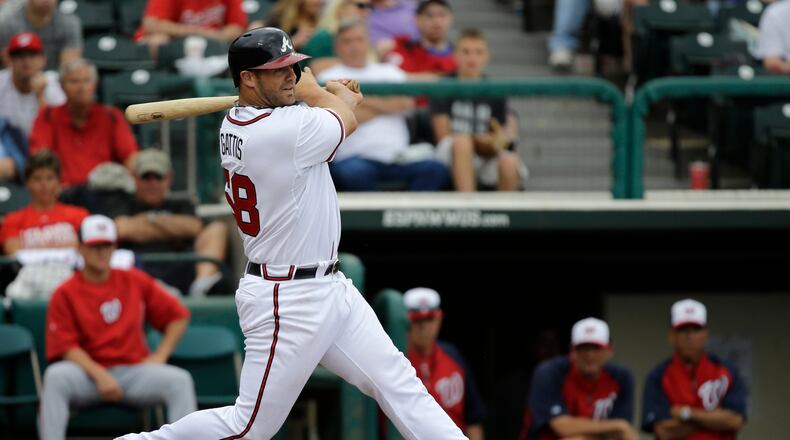Conventional wisdom in baseball says a prospect without much experience isn’t well-suited for a pinch-hitting role or bench job where he might go several days at a time without getting in a game.
Pinch-hitting is a tough job for anyone, much less a rookie.
That is the dilemma the Braves face with catcher/left fielder Evan Gattis, the 6-foot-3, 240-pound Texan who has 933 career plate appearances in the minor leagues, only 207 of which have come above Class A. But conventional thinking doesn’t necessarily apply to this unconventional 26-year-old slugger.
“Mechanically he’s solid — a big man with small-man mechanics,” said Braves hitting coach Greg Walker, describing the swing that’s produced a slew of line drives and longballs in batting practice, and a .423 average (11-for-26) with three doubles, two homers, seven RBIs and team-best .769 slugging percentage in 13 games.
The Braves have discussed keeping Gattis as a backup to catcher Gerald Laird until starter Brian McCann returns in April from shoulder-surgery rehab, and maybe carrying him beyond that as a third catcher/fifth outfielder and right-handed pinch-hitter.
Gattis has a .308 average with 44 homers and a .920 OPS in 832 minor-league at-bats, and this winter in Venezuela he hit .303 with a league-leading .595 slugging percentage,and tied for the league lead with 16 homers in 195 at-bats.
Still, having a prospect with no big-league experience fill a part-time/pinch-hitting role pretty much qualifies as outside-the-box thinking in baseball. The Braves usually have former lineup regulars in the latter stages of their careers for that job, “professional hitters” such as Eric Hinske.
But they haven't had a guy quite like Gattis knocking at the door. He was out of baseball nearly four years, did a stint in drug rehab, traveled the western United States doing odd jobs from janitor to ski-lift operator, then got the baseball itch again and played one year of college ball before the Braves drafted him in the 23rd round in 2010.
No one’s sure what he’ll do at the big-league level, but people paid to evaluate talent and make these decisions believe Gattis has a good shot at success in the majors, perhaps now in whatever role the Braves can carve for him.
He plays a serviceable left field despite playing there only since last summer, and his catching skills – blocking balls, throwing, calling a game – aren’t bad and have improved steadily, said Eddie Perez, bullpen coach and former catcher.
But it’s Gattis’ big bat that has the Braves considering a spot for him on the 25-man roster.
“He doesn’t try to do too much,” Walker said. “He understands a lot about hitting, and the way he goes about his work and all, I like a lot. Obviously I wish he had more experience, but you look at him mechanically – physically he’s a beast, and mechanically he’s sound. So now it becomes, could he handle the bright lights and all that?”
Walker has been around. He doesn’t get caught up in spring stats produced against a motley group of opposing pitchers.
“You see big donkeys in spring training every year and they have long swings, and they get on a roll and you say, ‘Man, this guy might can hit,’” Walker said. “Well, this guy (Gattis) is better than that. He’s got a real short, quick little swing.”
The type of approach that might lend itself to success in a part-time and/or pinch-hitting role?
“It should hold up,” he said. “It’s just the mental battle of being cool under fire, you know? Could he handle that? He’s sure given us no reason to believe that he can’t.”
On his last swing of a round of batting practice Sunday, Gattis crushed an opposite-field line drive that cleared the right-field wall and bullpen before bouncing onto one of the tarps that protect cars in the Braves executive parking lot.
“Way to get him over, Gat,” Walker said in a dead-pan tone. The joking reference was to how some hitters practice advancing a runner by stroking batting-practice grounders to the right side.
Gattis smiled and kept walking to his spot on the other side of the batting cage, to wait for his next round.
About the Author
Keep Reading
The Latest
Featured

